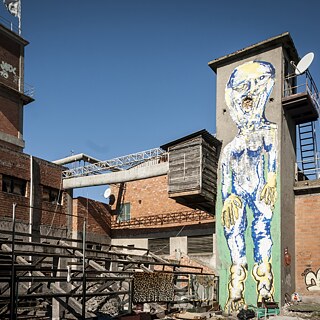The effects of the climate crisis reveal how inextricably linked ecological and social issues as well as global power structures and thus also the past, present and future are.
The project Ecological Futures, a cooperation between the Goethe-Institut and
ARCH+, addresses precisely this nexus and the plurality of stories, experiences and perspectives. It does not take the inquiry into technical or abstract global solutions to ecological problems as its starting point, but begins with the living conditions within a concrete socio-ecological assemblage. It starts from the possibilities for action of neighborhood initiatives, urban and environmental activists or the residents of a neighborhood.
It is about these diverse perspectives on the crisis and about developing models of transformation and visions of socio-ecological futures. It is about translocal networks and the opening up of opportunities for action on a micro-scale and about turning them into imitable models for a future living. Because only if we succeed in imagining desirable models of transformation and visions of the future can we overcome the fear of loss that is currently fueling populist movements all over the world, which simply deny the causes of the multiple crises.
Through the network of the Goethe-Institut, projects will be initiated worldwide, problems will be discussed and approaches to specific challenges will be developed and tried out. These local approaches will become models for further projects.
The core element of the project is the toolbox into which these models will flow. It will be a growing archive of the projects and at the same time an actual open source "toolbox" from which tools, ideas and methods for application and further development can be taken. They focus on specific problems and are designed in such a way that they present a whole bundle of practices and courses of action as an illustrative manual.
The toolbox, like the Ecological Futures project itself, is always a work in progress. The models, methods, ideas and concepts are the beginning of a multi-perspective negotiation of an understanding of the ecological crisis and are open to change. By asking about transformations, they also ask how and with which concepts, through which networks and alliances the present can be understood and the future imagined. So, this text is also a text in progress, a text that begins a process of reflection in the course of which it must be rewritten again and again.
Un'Altra Casa - the project in Rome
Squats often save buildings that have become obsolete from decay and demolition. They are therefore pioneers in the sustainable use of existing buildings. They also produce knowledge and structures that strengthen the agency of those involved. The necessary development and institutionalization of MAAM, the Museo dell'Altro e dell'Altrove di Metropoliz, now offers the opportunity to make these experiences of self-empowerment the starting point of the planning process. The invited groups BeL from Cologne, Planbude from Hamburg and Raumlabor from Berlin will report on how this can succeed and what problems are to be expected. As part of the project Ecological Futures, an international exchange of knowledge is being initiated with MAAM and cooperative tools for socio-ecological co-design are being discussed.
